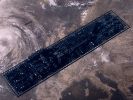Eye For Film >> Movies >> Aniara (2018) Film Review
Aniara
Reviewed by: Jennie Kermode

What should the interior of a spaceship look like? Most people have a very clear idea of this straight away, but of course, there are very few real spaceships out there. Most of what we imagine is based on ideas developed by a handful of science fiction writers and set designers in the Forties and Fifties. Aniara turns those ideas on their heads, introducing something much more natural and more likely, an Earth to Mars liner that looks as if it were designed by IKEA. There are hard-wearing carpets on the floors and smooth pine panelling on the walls, practical cabins in a variety of sizes and large public spaces full of soft-toned advertising and airport-style shops. This setting is more than just a nice bit of polish for the film - it's intrinsic to its central theme, because this is that rare and undervalued sub-genre, sociological science fiction.
At the heart of the story is the Mimaroben (Emelie Jonsson), the woman responsible for looking after the mental health of the ship's passengers and the facilitator of a singular invention, the Mima. A bit like Star Trek's holodeck, this consists of a room designed to project calming illusions, in this case all the same - an impression of Earth as it used to be (the only hint we get about the plane's current condition). Within it, trees sway, birds sing, brooks babble and everything is wonderful. Alive on some level, the Mima draws on the brainwaves of its users in constructing these illusions. The Mimaroben's relationship with it is not just professional but also personal.

The voyage to Mars is lengthy but not overwhelmingly so. Not everybody feels the need to use the Mima, with many regarding it simply as a curiosity. When the ship collides with debris and is forced to jettison its fuel, however, everything changes. You'll need only a very basic grasp of astrophysics to understand how catastrophic a tiny drift off course can be when working on an astronomical scale. As the crew strive frantically to come up with a solution (and engage in quite a bit of wishful thinking), it's left to the Mimaroben to deal with the increasingly agitated state of the passengers. What initially manifests as a pattern of panic attacks and incidences of depression takes much, much stranger forms as the months - and years - go by.
Aniara is up there with Interstellar in terms of its appreciation of the enormity of what space travel means. This is not the pacey, action-packed science fiction of pulp novels but something much more focused on interior landscapes and blind existential terror. For the most part it's well grounded in behavioural research and this gives it a confidence that manifests at every level of the script. The introduction of the Mimaroben's romantic relationship with another crew member is handled with elegant sleight of hand. The quiet politeness with which people collectively surrender to their fate owes something to middle class Swedish culture and something to the work of Nevil Shute. The practicalities of day to day survival gradually give way to an all-consuming search for meaning en route to an ending that is both bleak and strangely beautiful.
Although little of this is new, it's delivered with poise and grace, aided by finely tuned performances. Interpersonal dynamics are explored with a light touch but it takes only the slightest deviation to reveal great gulfs of darkness. As Douglas Adams said, space is big. Aniara will make you feel it.
Reviewed on: 12 Nov 2019















